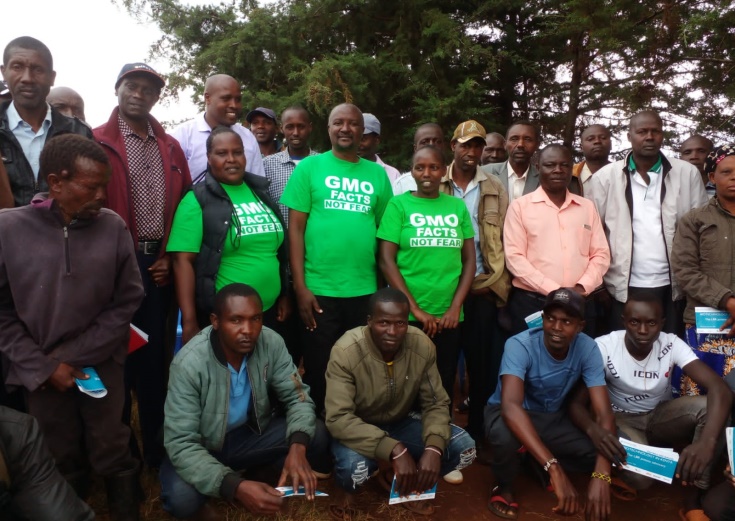In the next series of posts, I will be capturing the GMO FACTS not FEAR advocacy team’s campaigns and reporting on our experiences in potato growing areas across the county. The team is in the quest to educate Kenyan Irish potato growers and consumers about the benefits of the late blight-resistant potatoes and GMOs.
Our first function held between February 19th to 24th 2024 was in Bungoma and Trans-nzoia counties found in western Kenya. The two counties which border Uganda on the west are found on the slopes of Mt. Elgon which has rich volcanic soils and the right temperatures for potato farming.


Trans-nzoia County is considered the National breadbasket with a cosmopolitan population that does extensive farming. Right from livestock production, poultry, horticulture, and other modes of farming, Kitale town which is the county’s headquarters has seen it all. Photo Credits: Kataru Concepts.
Our approach
To succeed in this advocacy, we’ve adopted a simple but very effective approach that brings all major players on board. To push through an agenda touching on human lives in Kenyan communities, one needs to recognize all stakeholders and involve them at all times. Our campaign slogan of “GMO FACTS not FEAR” has worked to our advantage since it appears to adopt the middle ground yet packed with the potent it deserves.
Our stakeholders included the following;
- The national government administration led by the county commissioners’ office: Lifting the ban on GMOs made the campaign for acceptance of the technology technically a government project. In both Bungoma and Trans-nzoia counties, the national government representatives were very cooperative. They supported the initiative and wondered why we had taken too much time to hit the road and give farmers facts.
- County government Ministries of Agriculture: In both counties, we managed to visit the CECM (Equivalent of county ministers for agriculture) and briefed them on our expected activities in their backyards. They all welcomed us with open arms and expressed their hope that the late blight-resistant potato (LBR potato) would end farmers’ nightmare of battling late blight disease.



Top: County Executive Committee Members CECM (Minister for agriculture). Bottom: Trans-nzoia county Phanice Khatundi. (far L): Chief officer, Agriculture, ministry of agriculture Bungoma county and Chief officer livestock, ministry of agriculture Bungoma county (far R) receiving “GMO FACTS not FEAR” campaign booklet from James Kamuye Kataru. Photo Credit: Kataru Concepts
- County Director of Agriculture: Through the office of the county directors of Agriculture, which coordinates both national and county government extension services in the agricultural sector, we were given agricultural extension officers to accompany and introduce us to their farmers.
- Opinion leaders and local elders: In Mt. Elgon, elders are held in high esteem. Their word is law and advice is non-negotiable. They are listened to by everybody from their communities. Led by the local chief, village elder, and the leader of the community we were visiting, the elders gave us a warm reception, mobilized farmers in their communities, and ensured we were listened to without interference.
- Religious leaders: The clergy is so influential on matters affecting their flocks in Kenya. The moment a religion protests or opposes an idea, the community casts aspersions on the same. A good example is when we were forced to change our cameraman who happens to be the son of a local church bishop. The father couldn’t allow the son to take photos of a pro-GMO campaign because he still thrives on misinformation! So, it’s quite important to have the clergy understand biotechnology to make the right choices.
- Political leaders and county assemblies: In Trans-nzoia County, we encountered a situation where the county assembly had a rough patch with GMOs. They had once shot down a motion to allow field trials for one of the GMO crops that have been released by the National Biosafety Authority (NBA) but after realizing that they might have been acting on misinformation, they requested a special session with GMO experts and advocacy teams to address the assembly and bring them on board regarding matters related to the technology.


About 92 farmers attended our first Late Blight Resistant potato (GMO) sensitization meeting at Kapomboi in Mt. Elgon region, Trans-nzoia county. Photo Credit: Kataru Concepts.
- Traders, riders, and members of the public: According to our findings, the public uses anti-GMO statements to make fun and seek further indulgence to help understand the truth. In Bungoma County, we met a senior official who insisted that all GMOs she had eaten were tasteless! She wanted us to explain to her why.
In Trans-nzoia too, we met a young man who insisted that all the tomatoes at his local market were tasteless GMOs, he did this while laughing. It was common to find traders, motorbike riders, and others who after noticing our branded shirts stopped, shook our hands, and inquired why GMO foods at their market centers were so big.
After engaging inquisitive mwananchi and making them understand that size doesn’t translate to GMO, and listing the three crops released for propagation, everybody rolled with laughter and demanded that the LBR potato be released as soon as possible and seed provided for them to plant.
As we head to other counties for more engagements, I am confident that our first foray has set the tempo and crafted a template of what to expect and how to go about it. As we meet more farmers, we expect one of the most exciting engagements on GMOs and biotechnology across the nation.

